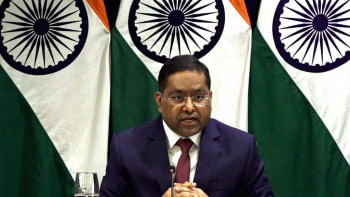India will achieve net zero emissions by 2070: Modi tells COP26

In a landmark decision in the face of repeated calls by developed nations, Indian Prime Minister Narendra Modi announced at the climate summit in Glasgow yesterday that his country will achieve the target of net zero emissions by the year 2070 to help fight the adverse effects of climate change.
The pledge to reach net zero by 2070 is part of Modi's five-point climate action plan which includes India reaching its non-fossil energy capacity to 500 GW by 2030, meeting 50 percent of its energy requirements from renewable energy in the next nine years, reducing total projected carbon emissions by one billion tonnes and carbon intensity of its economy by less than 45 percent, reports our New Delhi correspondent.
This was the first time India, the world's fourth biggest emitter of greenhouse gas, spelt out the target of achieving net zero, which gives the country 10 years more than China, the third largest emitter, and 20 more than the US and European Union, the top two emitters of greenhouse gas.
Net zero refers to a balance between the quantity of emissions of greenhouse gases, that raise the globe's temperature, and an equal amount of the gases absorbed by forest cover, crops, soils and nascent "carbon capture technology."
The US, Britain and the European Union have set a target date of 2050 to reach net zero and China and Saudi Arabia, the world's largest oil producer, by 2060.
According to the speech officially made available, Modi described his five-point climate action plan as "panchamrit" (a Sanskrit word) which he said "will be an unprecedented contribution of India to climate action."
He called for a sustainable lifestyle envisaging "mindful and utilization instead of mindless and destructive consumption" which can "revolutionize many sectors like fishing, agriculture, wellness, dietary choices, packaging, housing, hospitality, tourism, clothing, fashion, water management and energy.
"These are topics where each of us has to make conscious choices every day. These daily choices of billions of people around the world will take the fight against climate change, billions of steps forward every day," according to Modi.


 For all latest news, follow The Daily Star's Google News channel.
For all latest news, follow The Daily Star's Google News channel. 



Comments